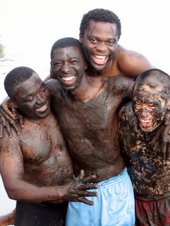
I didn’t have many friends growing up in Timonium, Maryland until the day my feet met the pentagonal panels of a soccer ball. I, as billions of other youth in the world, was given the incredible gift of loving a game that transcends language, cultures, and sometimes even wars. It was the fifteen minutes a day of recess that I lived for as a young American boy and the feel of the dirt kicking up off my heels as I threaded my way through the crowds of students gathered around the playground.
About two decades later, in the northern region of war-torn Uganda, I found myself with a soccer ball looking out of the balcony of my hotel room. In the distance, I could see dozens of young, shoeless Ugandan children playing soccer with a rock that they had covered with layers of rubber bands and plastic bags. Minutes later, I was being outplayed by kids a quarter of my size and age. While I was clearly not at their skill level nor could I speak their language, we shared the same love of soccer and that was all that seemed to matter.
In 1982, Italy’s World Cup victory helped to unite a country that was trying to overcome a decade of national terrorism known as the anni di piombo. Four years later, an Argentine World Cup victory helped to bring life to a newly beginning democracy that was recovering from its dictatorial past. Germany’s victory in 1990 came on the heels of the fall of the Berlin Wall. In 1995, simply by qualifying for the World Cup, the Cote d’Ivoire’s multiethnic team brought a temporary ceasefire and peace to a country ravished by political and ethnic warfare, and, through their stunning example of teamwork, showed their fellow countrymen and women that there was hope for a multicultural society to exist in the Ivory Coast.
In 2010, South Africa will become the first sub-Saharan country to host the World Cup, an amazing opportunity to showcase the growth and development of a country still feeling the wounds of apartheid and still fighting the challenges of extreme poverty and HIV/AIDS.
Being the most watched and celebrated sport in the in world makes the social, economic, and political impact of soccer undeniable. It has the power to life the human spirit, revitalize economies, and to unite entire countries. Through programs like Ethan Zahn’s (of Survivor: Africa fame) Grassrootsoccer which uses soccer to educate youth about life skills, team work, and HIV/AIDS and the Global Youth Partnership for Africa’s Girls Kick It Program that help women gain access to education and empowers them to take leadership roles in their communities, soccer, or football as most everyone else in the world calls it, is arguably changing lives more than most politicians are.
This summer, I will be travelling with 5 US college students to Uganda to meet with Ugandan college students to examine the effect of soccer on the Ugandan community and to try and create more opportunities for the sport to improve the lives of the people who play and watch it.
Before I leave however, I will have the awesome opportunity to work with Street Soccer, an organization that uses soccer to better the lives of the Homeless in the US. In fact, over the past three years, Street Soccer has sent a US team to the Homeless World Cup, an international competition that has brought over 500 homeless soccer players from 48 countries throughout the world to places like Scotland, South Africa, and Denmark in order to compete.
According to the website of the Homeless World Cup, “The impact is consistently significant year on year with 73% of players changing their lives for the better by coming off drugs and alcohol, moving into jobs, education, homes, training, reuniting with families and even going on to become players and coaches for pro or semi-pro football teams.”
There are a billion people in the world, or about fifteen percent of the world’s population, who are homeless. And while they need homes, food and clean water, and clothes, there are many less tangible things that soccer provides that helps them get these things. Soccer provides a sense of team and community, the confidence and resilience needed to overcome extreme poverty, and many more non-measurable benefits that bring more opportunities to the lives of the Homeless.
This June 26-29, Street Soccer USA will be hosting the Homeless US Cup in Washington DC to field the team that will represent the US in this year’s Homeless World Cup that will take place in Melbourne, Australia. Eleven US teams will be in attendance. For more information, please visit the Street Soccer blog.
If you would like to help, please do so by contacting me at pwu@kippgcp.org. We are in need of as many volunteers as possible for many different needs from simply handing out refreshments to our players to guiding them through the city. It will not only help to change the lives of those whom you are helping, but I promise it’ll change your life as well.
Soccer is more than just a game: it is the international language of peace, perseverance, and possibilities.

